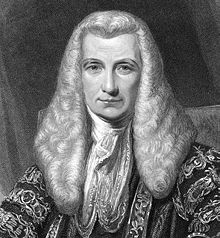James Abercromby, 1st Baron Dunfermline
|
The Right Honourable The Lord Dunfermline PC |
|
|---|---|
 |
|
| Speaker of the House of Commons | |
|
In office 19 February 1835 – 1839 |
|
| Monarch |
William IV Victoria |
| Preceded by | Charles Manners-Sutton |
| Succeeded by | Charles Shaw-Lefevre |
| Judge Advocate General | |
|
In office 12 May 1827 – 21 January 1828 |
|
| Monarch | George IV |
| Prime Minister |
George Canning The Viscount Goderich |
| Preceded by | Sir John Beckett, Bt |
| Succeeded by | Sir John Beckett, Bt |
| Lord Chief Baron of the Court of Exchequer in Scotland |
|
|
In office 1830–1832 |
|
| Monarch | William IV |
| Preceded by | Sir Samuel Shepherd |
| Succeeded by | Office abolished |
| Master of the Mint | |
|
In office 13 June 1834 – 14 November 1834 |
|
| Monarch | William IV |
| Prime Minister | The Viscount Melbourne |
| Preceded by | The Lord Auckland |
| Succeeded by | Alexander Baring |
| Personal details | |
| Born | 7 November 1776 |
| Died | 17 April 1858 (aged 81) Colinton House, Midlothian |
| Nationality | British |
| Political party | Whig |
| Spouse(s) | Mary Anne Leigh (d. 1874) |
James Abercromby, 1st Baron Dunfermline PC (7 November 1776 – 17 April 1858), was a British barrister and Whig politician. He served as Speaker of the House of Commons between 1835 and 1839.
Abercromby was the third son of General Sir Ralph Abercromby, who fell at the Battle of Alexandria, and Mary, 1st Baroness Abercromby, daughter of John Menzies of Fernton, Perthshire. He was the younger brother of George Abercromby, 2nd Baron Abercromby and Sir John Abercromby and the elder brother of Alexander Abercromby. He attended the Royal High School, Edinburgh, and was called to the English Bar, Lincoln's Inn, in 1801. He became a commissioner of bankruptcy and later appointed steward of the Duke of Devonshire's estates.
Abercromby sat as Whig Member of Parliament for Midhurst between 1807 and 1812 and for Calne between 1812 and 1830. He brought forwards two motions for bills to change the representation for Edinburgh in parliament. He received great support but no change was made until the Reform Act 1832. In 1827 he sworn of the Privy Council and appointed Judge-Advocate-General by George Canning, a post he held until 1828, the last months under the premiership of Lord Goderich.
...
Wikipedia
